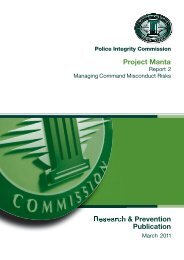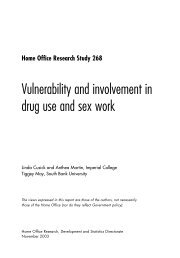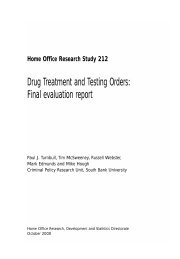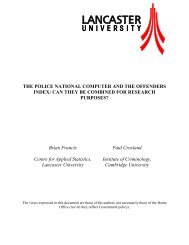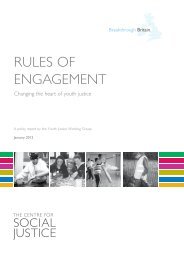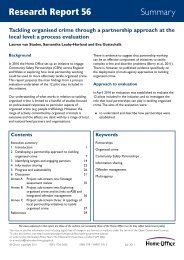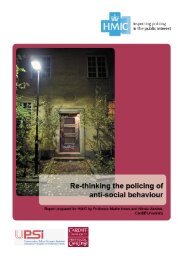Policing Large Scale Disorder: Lessons from the disturbances of ...
Policing Large Scale Disorder: Lessons from the disturbances of ...
Policing Large Scale Disorder: Lessons from the disturbances of ...
Create successful ePaper yourself
Turn your PDF publications into a flip-book with our unique Google optimized e-Paper software.
Ev w12 Home Affairs Committee: Evidence<br />
(c) People were confused about who was supposedly speaking on <strong>the</strong>ir behalf—elected Councillors/Members<br />
<strong>of</strong> Parliament or “community leaders”? Local councillors were not very visible on <strong>the</strong> television, in <strong>the</strong> press<br />
or on <strong>the</strong> streets and some <strong>of</strong> <strong>the</strong> individuals who proclaimed <strong>the</strong>y were speaking on behalf <strong>of</strong> <strong>the</strong> community<br />
were unknown to <strong>the</strong> community.<br />
3.8 Ignoring experience<br />
(a) Each bout <strong>of</strong> riots has been followed by government-sponsored inquiries as well as independent research.<br />
What does that research tell us about causes and consequences and what can we learn <strong>from</strong> <strong>the</strong> remedial<br />
strategies adopted? Is <strong>the</strong>re any evidence that we are learning <strong>from</strong> this body <strong>of</strong> knowledge?<br />
3.9 Funding cuts<br />
(a) We know what works in supporting young people in coming to terms with a hard and complicated world.<br />
Mentoring programmes have been important as have parenting support initiatives and family intervention in<br />
general. Provision developed and provided by local communities and organisations is particularly valuable, yet<br />
this provision has been decimated in <strong>the</strong> expenditure cuts.<br />
(b) The loss <strong>of</strong> services has had a disproportionate impact on <strong>the</strong> local community. Youth services are<br />
essential for both development and diversionary purposes. Youth Workers have played pivotal roles particularly<br />
as positive male role models and voices <strong>of</strong> authority. This work is expensive but does provide real results.<br />
(c) When services are cut back it undermines trust and confidence—eg if <strong>the</strong> state can withdraw funding<br />
<strong>from</strong> vital public and voluntary sector services what does that say about its attitude to socially and economically<br />
deprived communities?<br />
(d) Blanket cuts can result in “throwing <strong>the</strong> baby out with <strong>the</strong> bath water”. Many valuable services have<br />
been lost and communities left bereft <strong>of</strong> essential support. Government and local authorities should undertake<br />
a review <strong>of</strong> what was working and retain/reinstate programmes that make a real difference, eg Surestart.<br />
3.10 Community/Communities<br />
(a) Through <strong>the</strong> amplified voices and actions <strong>of</strong> a few, everyone is suffering.<br />
(b) Society has become too complacent. The community has a collective responsibility for creating a safe<br />
environment. It is nei<strong>the</strong>r necessary nor desirable to leave it all to state. Communities need to have more<br />
ownership and control over decision-making processes. We need to build on solid foundations, whe<strong>the</strong>r faithbased<br />
or reflecting traditional community values. We have a range <strong>of</strong> community foundations on which we can<br />
build—neighbourhood forums and residents’ groups, third sector organisations, faith organisations and private<br />
sector networks. Some <strong>of</strong> this is becoming increasingly fragile as a consequence <strong>of</strong> funding cuts, a trend that<br />
needs to be reversed as a matter <strong>of</strong> urgency.<br />
(c) We need to invest in our community infrastructure and in our people. A hypo<strong>the</strong>sis was raised that 95%<br />
<strong>of</strong> all funding into <strong>the</strong> area is consumed within <strong>the</strong> system. This needs to be explored and more specifically,<br />
more funding needs to be getting through to local grassroots community organisations.<br />
(d) Delegates acknowledged <strong>the</strong> swift action taken by Birmingham City Council to clear rubbish after <strong>the</strong><br />
<strong>disturbances</strong> and compared it to everyday issues <strong>of</strong> rubbish clearance in local neighbourhoods. They expressed<br />
concern that <strong>the</strong> Council needs to improve on this over <strong>the</strong> long term in order to be trusted on larger more<br />
complex issues. They raised concerns about <strong>the</strong> loss <strong>of</strong> environmental wardens and depletion <strong>of</strong> services,<br />
concluding that communities are now getting “less” help.<br />
4. Recommendations<br />
This section lists <strong>the</strong> recommendations proposed by Conference delegates. The recommendations uphold <strong>the</strong><br />
consensus view that this is a complex situation which will not be resolved by a single intervention or a single<br />
stakeholder group. Notwithstanding this, <strong>the</strong> government is perceived as <strong>the</strong> body that must take <strong>the</strong> lead and<br />
create <strong>the</strong> environment (policy and financial) where o<strong>the</strong>r stakeholders can play <strong>the</strong>ir part.<br />
4.1 <strong>Policing</strong><br />
(a) More (not less) robust and responsive neighbourhood policing.<br />
(b) The style <strong>of</strong> neighbourhood policing needs to be sensitive to issues such as Stop and Search as Stop and<br />
Search has <strong>the</strong> potential to damage police/community relations as well as community cohesion.<br />
4.2 Funding<br />
(a) No cuts in policing funding.<br />
(b) Funding attracts organisations into an area but when <strong>the</strong> funding ends <strong>the</strong>y go and <strong>the</strong>re is no<br />
sustainability. Funding should be targeted at organisations already located within <strong>the</strong> area.




